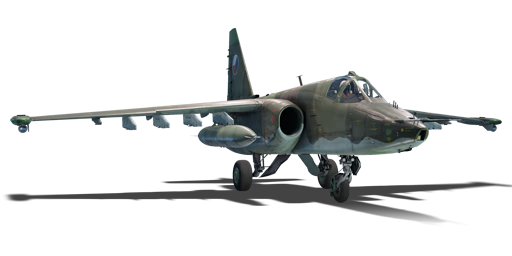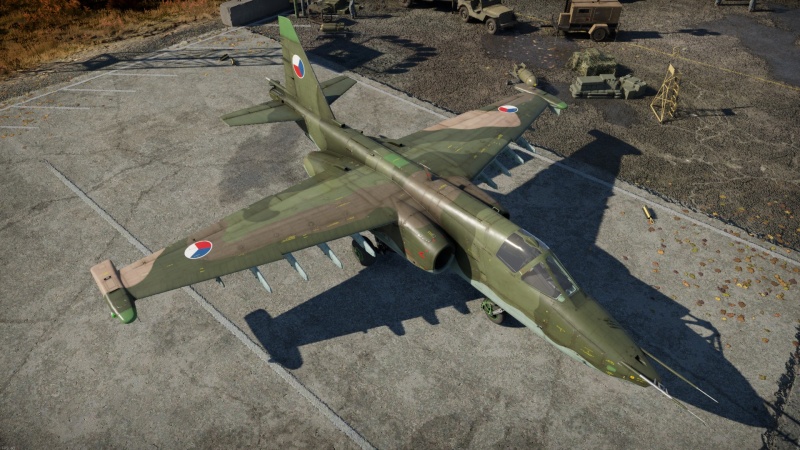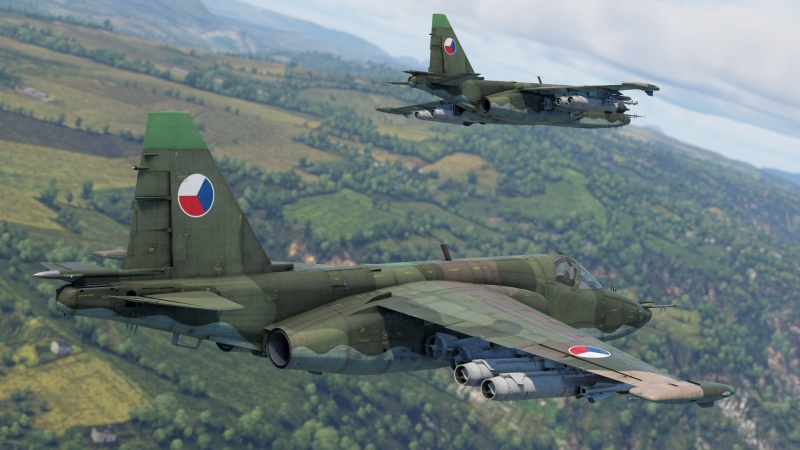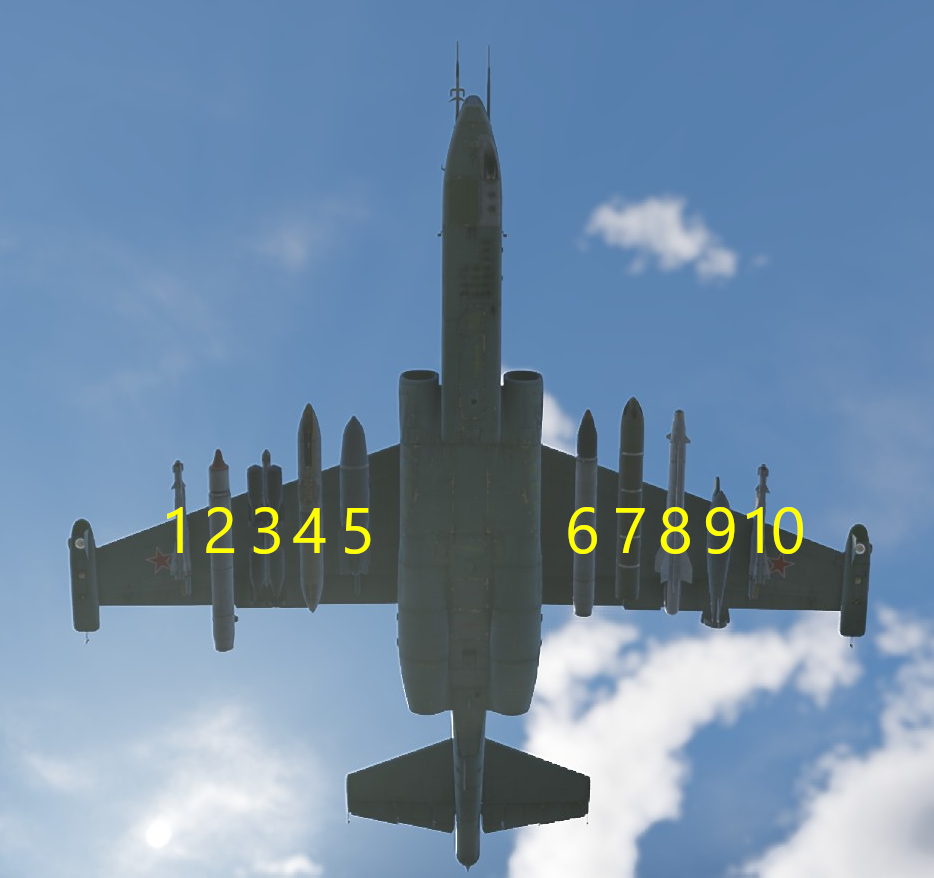Difference between revisions of "Su-25K"
Colok76286 (talk | contribs) (Undo revision 177636 by U102519203 (talk)) |
(→Suspended armament: Updated) |
||
| (4 intermediate revisions by 3 users not shown) | |||
| Line 19: | Line 19: | ||
=== Flight performance === | === Flight performance === | ||
{{Specs-Avia-Flight}} | {{Specs-Avia-Flight}} | ||
| − | <!-- ''Describe how the aircraft behaves in the air. Speed, manoeuvrability, acceleration and allowable loads - these are the most important characteristics of the vehicle.'' -->Same as the base model in Soviet service, Su-25K is equipped with a pair of UMPO R-95SH non-afterburning turbofan engines on the sides of the airframe and is one of the last jets designed by Sukhoi with a straight wing. Since the Su-25K was designed as an attacker, it performs best at low altitude and taking it into high altitude engagements is not recommended. Another iconic feature of Su-25s are the extensive protection all-around for the pilot and critical components of the jet. Although this adds to the survivability of the aircraft against smaller weapons, it also reduces the overall | + | <!-- ''Describe how the aircraft behaves in the air. Speed, manoeuvrability, acceleration and allowable loads - these are the most important characteristics of the vehicle.'' --> |
| + | Same as the base model in Soviet service, Su-25K is equipped with a pair of UMPO R-95SH non-afterburning turbofan engines on the sides of the airframe and is one of the last jets designed by Sukhoi with a straight wing. Since the Su-25K was designed as an attacker, it performs best at low altitude and taking it into high altitude engagements is not recommended. Another iconic feature of Su-25s are the extensive protection all-around for the pilot and critical components of the jet. Although this adds to the survivability of the aircraft against smaller weapons, it also reduces the overall manoeuvrability of the aircraft as a result of the added weight. | ||
{| class="wikitable" style="text-align:center" width="70%" | {| class="wikitable" style="text-align:center" width="70%" | ||
| Line 122: | Line 123: | ||
The cockpit is very well armoured. The pilot is protected on the front and sides by 24 mm of titanium alloy, the bottom and rear of the pilot is covered by 10 mm of titanium alloy. Additionally there is 57 mm thick bulletproof glass in the front of the cockpit. | The cockpit is very well armoured. The pilot is protected on the front and sides by 24 mm of titanium alloy, the bottom and rear of the pilot is covered by 10 mm of titanium alloy. Additionally there is 57 mm thick bulletproof glass in the front of the cockpit. | ||
| − | |||
| − | |||
=== Modifications and economy === | === Modifications and economy === | ||
| Line 132: | Line 131: | ||
{| class="wikitable" style="text-align:center" | {| class="wikitable" style="text-align:center" | ||
|- | |- | ||
| − | ! colspan=" | + | ! colspan="5" | [[Ballistic Computer]] |
|- | |- | ||
| − | ! CCIP (Guns) !! CCIP (Rockets) !! CCIP (Bombs) !! CCRP (Bombs) | + | ! CCIP (Guns) !! CCIP (Rockets) !! CCIP (Bombs) !! CCRP (Bombs) !! Lead indicator |
|- | |- | ||
| − | | {{Tick}} || {{Tick}} || {{Tick}} || {{Tick}} | + | | {{Tick}} || {{Tick}} || {{Tick}} || {{Tick}} || {{Cross}} |
|- | |- | ||
|} | |} | ||
| Line 146: | Line 145: | ||
The '''''{{PAGENAME}}''''' is armed with: | The '''''{{PAGENAME}}''''' is armed with: | ||
| − | * 1 x 30 mm GSh-30-2 cannon, chin-mounted (250 rpg) | + | * 1 x 30 mm GSh-30-2 cannon, chin-mounted (250 rpg) |
| + | * 128 x countermeasures | ||
=== Suspended armament === | === Suspended armament === | ||
| Line 216: | Line 216: | ||
| || || 1 || 1 || || || 1 || 1 || || | | || || 1 || 1 || || || 1 || 1 || || | ||
|- | |- | ||
| − | ! | + | ! 820 l drop tanks |
| − | | || || || || 1 || 1 || || || || | + | | || || 1 || || 1 || 1 || || 1 || || |
|- | |- | ||
| − | | colspan="11" | Maximum permissible weight imbalance: 1,500 kg | + | | colspan="11" | Maximum permissible loadout weight: 4,400 kg<br>Maximum permissible wing load: 2,200 kg<br>Maximum permissible weight imbalance: 1,500 kg |
|- | |- | ||
|} | |} | ||
| Line 226: | Line 226: | ||
{{Navigation-First-Simple-Line}} | {{Navigation-First-Simple-Line}} | ||
| − | * | + | * 4 x 820 l drop tanks |
* 2 x R-60MK missiles + 32 x 100 kg OFAB-100 bombs (3,200 kg total) | * 2 x R-60MK missiles + 32 x 100 kg OFAB-100 bombs (3,200 kg total) | ||
* 2 x R-60MK missiles + 8 x 250 kg OFAB-250sv bombs (2,000 kg total) | * 2 x R-60MK missiles + 8 x 250 kg OFAB-250sv bombs (2,000 kg total) | ||
| Line 243: | Line 243: | ||
* 2 x R-60MK missiles + 2 x 23 mm GSh-23L cannons + 120 x S-8KO rockets | * 2 x R-60MK missiles + 2 x 23 mm GSh-23L cannons + 120 x S-8KO rockets | ||
* 2 x R-60MK missiles + 4 x S-25O rockets + 4 x 500 kg FAB-500M-62 bombs (2,000 kg total) | * 2 x R-60MK missiles + 4 x S-25O rockets + 4 x 500 kg FAB-500M-62 bombs (2,000 kg total) | ||
| + | * 4 x Kh-25ML missiles | ||
| + | * 2 x Kh-29L missiles | ||
{{Navigation-End}} | {{Navigation-End}} | ||
Revision as of 12:38, 16 March 2024
| This page is about the premium Soviet strike aircraft Su-25K. For other versions, see Su-25 (Family). |
Contents
Description
During the early 1970s, it was noted that the Soviet Air Force's CAS capabilities were very underwhelming compared to their adversaries. The ground attack variants of the MiG-21 and MiG-23 lacked sufficient armour, cockpit visibility, and ground ordnance for heavy ground attack missions, whereas the Su-7 and older variants of the Su-17 were deemed "obsolete" and did not meet the requirements of the Red Army. As a result, the Soviet Ministry of Defence announced a new design competition among its design bureaus, for a new heavy-weight subsonic dedicated attacker. In the end, of the promising designs of the Sukhoi T-8 and the Ilyushin IL-102, the Sukhoi design was chosen and ordered into production in 1978 as the "Su-25". The aircraft would enter production just in time to see service in the Soviet-Afghan War the following year. Shortly after it entered production, a slightly modified variant with cheaper/simpler electronics was devised for export, titled the Su-25K.
Introduced in Update "Drone Age", the Su-25K is the export version of the base Su-25 model, intended for Warsaw-Pact countries and overseas customers with minor internal differences in terms of certain equipment. Due to this similarity with its base model, the Su-25K plays in an almost completely identical manner. The aircraft is most remarkable in mixed battles, where its large amount of countermeasures, great armour around the pilot and engines, and plethora of guided and unguided ground ordnance (coupled with two R-60MK all aspect air-to-air missiles for self defence) makes it a true force to be reckoned with in Ground Realistic and Ground Simulator battles. The Su-25K is also no slouch either in air battles, due to its stable airframe, all aspect missiles, abundant countermeasures, powerful 30 mm cannon, and surprising agility when not loaded with the usual heavy ground-striking ordnance. All in all, the Su-25K is a very potent aircraft wherever it is used, and its premium earnings bonuses are a nice extra over its tech tree brother.
General info
Flight performance
Same as the base model in Soviet service, Su-25K is equipped with a pair of UMPO R-95SH non-afterburning turbofan engines on the sides of the airframe and is one of the last jets designed by Sukhoi with a straight wing. Since the Su-25K was designed as an attacker, it performs best at low altitude and taking it into high altitude engagements is not recommended. Another iconic feature of Su-25s are the extensive protection all-around for the pilot and critical components of the jet. Although this adds to the survivability of the aircraft against smaller weapons, it also reduces the overall manoeuvrability of the aircraft as a result of the added weight.
| Characteristics | Max speed (km/h at 1,000 m) |
Max altitude (metres) |
Turn time (seconds) |
Rate of climb (metres/second) |
Take-off run (metres) | |||
|---|---|---|---|---|---|---|---|---|
| AB | RB | AB | RB | AB | RB | |||
| Stock | 968 | 961 | 11000 | 27.4 | 28.0 | 66.8 | 62.4 | 850 |
| Upgraded | 989 | 979 | 26.6 | 27.0 | 94.2 | 79.4 | ||
Details
| Features | |||||
|---|---|---|---|---|---|
| Combat flaps | Take-off flaps | Landing flaps | Air brakes | Arrestor gear | Drogue chute |
| ✓ | X | ✓ | ✓ | X | ✓ |
| Limits | ||||||
|---|---|---|---|---|---|---|
| Wings (km/h) | Gear (km/h) | Flaps (km/h) | Max Static G | |||
| Combat | Take-off | Landing | + | - | ||
| 1,100 | 420 | 900 | N/A | 420 | ~__ | ~__ |
| Optimal velocities (km/h) | |||
|---|---|---|---|
| Ailerons | Rudder | Elevators | Radiator |
| < ___ | < ___ | < ___ | N/A |
Engine performance
| Engine | Aircraft mass | |||||
|---|---|---|---|---|---|---|
| Engine name | Number | Basic mass | Wing loading (full fuel) | |||
| UMPO R-95SH | 2 | 10,236 kg | ___ kg/m2 | |||
| Engine characteristics | Mass with fuel (no weapons load) | Max Gross Weight | ||||
| Weight (each) | Type | 8m fuel | 20m fuel | 29m fuel | ||
| 990 kg | Axial-flow turbojet | 11,106 kg | 12,210 kg | 13,136 kg | 17,678 kg | |
| Maximum engine thrust @ 0 m (RB/SB) | Thrust to weight ratio @ 0 m (100%) | |||||
| Condition | 100% | WEP | 8m fuel | 20m fuel | 29m fuel | MGW |
| Stationary | 3,526 kgf | N/A | 0.63 | 0.58 | 0.54 | 0.40 |
| Optimal | 3,608 kgf (200 km/h) |
N/A | 0.65 | 0.59 | 0.55 | 0.41 |
Survivability and armour
The Su-25K is known for its survivability, anecdotally being able to take a few missile hits without suffering any damage compromising its airworthiness, though this ability is inconsistent and should not be relied upon. The airframe is able to sustain rear hits from missiles with a small warhead, especially the FIM-92 Stinger. Occasionally the Su-25K is able to sustain continued hits from Stingers and Roland 1s.
128 flares/chaff launched two of each at a time provide the Su-25K with the chance to evade missiles, which should be the primary form of defense. A lack of afterburner increases flare effectiveness and only more advanced missiles such as the AIM-9L at very short ranges are able to track the aircraft from behind through flares. Chaff will be able to decoy less advanced radar missiles but in order to defeat more advanced versions, chaff has to be deployed while notching.
The aircraft remains decently controllable upon loss of tail control, wingtips, or an engine. The aircraft remains near-fully controllable upon loss of the rudder and occasionally can fly without the vertical stabilizer.
The fuel tanks are self-sealing and the aircraft has an engine fire extinguishing system. A single section of fuel tank is protected by 18 mm of steel.
The cockpit is very well armoured. The pilot is protected on the front and sides by 24 mm of titanium alloy, the bottom and rear of the pilot is covered by 10 mm of titanium alloy. Additionally there is 57 mm thick bulletproof glass in the front of the cockpit.
Modifications and economy
Armaments
| Ballistic Computer | ||||
|---|---|---|---|---|
| CCIP (Guns) | CCIP (Rockets) | CCIP (Bombs) | CCRP (Bombs) | Lead indicator |
| |
|
|
|
|
Offensive armament
The Su-25K is armed with:
- 1 x 30 mm GSh-30-2 cannon, chin-mounted (250 rpg)
- 128 x countermeasures
Suspended armament
The Su-25K can be outfitted with the following ordnance:
| 1 | 2 | 3 | 4 | 5 | 6 | 7 | 8 | 9 | 10 | ||
|---|---|---|---|---|---|---|---|---|---|---|---|
| 23 mm GSh-23L cannons (250 rpg) | 1 | 1 | 1 | 1 | |||||||
| 100 kg OFAB-100 bombs | 4 | 4 | 4 | 4 | 4 | 4 | 4 | 4 | |||
| 250 kg OFAB-250sv bombs | 1 | 1 | 1 | 1 | 1 | 1 | 1 | 1 | |||
| 250 kg OFAB-250Sh bombs | 1 | 1 | 1 | 1 | 1 | 1 | 1 | 1 | |||
| 500 kg FAB-500M-62 bombs | 1 | 1 | 1 | 1 | 1 | 1 | 1 | 1 | |||
| 500 kg FAB-500Sh bombs | 1 | 1 | 1 | 1 | 1 | 1 | 1 | 1 | |||
| ZB-500 incendiary bombs | 1 | 1 | 1 | 1 | 1 | 1 | 1 | 1 | |||
| S-5K rockets | 32 | 32 | 32 | 32 | 32 | 32 | 32 | 32 | |||
| S-8KO rockets | 20 | 20 | 20 | 20 | 20 | 20 | 20 | 20 | |||
| S-13OF rockets | 5 | 5 | 5 | 5 | 5 | 5 | 5 | 5 | |||
| S-24B rockets | 1 | 1 | 1 | 1 | 1 | 1 | 1 | 1 | |||
| S-25O rockets | 1 | 1 | 1 | 1 | 1 | 1 | 1 | 1 | |||
| S-25OF rockets | 1 | 1 | 1 | 1 | 1 | 1 | 1 | 1 | |||
| S-25OFM rockets | 1 | 1 | 1 | 1 | 1 | 1 | 1 | 1 | |||
| Kh-25 missiles | 1 | 1 | 1 | 1 | |||||||
| Kh-25ML missiles | 1 | 1 | 1 | 1 | |||||||
| Kh-29L missiles | 1 | 1 | |||||||||
| R-60MK missiles | 1 | 1 | |||||||||
| S-25L missiles | 1 | 1 | 1 | 1 | |||||||
| 820 l drop tanks | 1 | 1 | 1 | 1 | |||||||
| Maximum permissible loadout weight: 4,400 kg Maximum permissible wing load: 2,200 kg Maximum permissible weight imbalance: 1,500 kg | |||||||||||
| Default weapon presets | |
|---|---|
| |
Usage in battles
The Su-25K is a support plane. It is a slow plane compared to most other planes, therefore altitude is important since you are likely to Boom and Zoom. You need to look around constantly to prevent unexpected attacks. Your main worries will be planes like the A-5C or the F-5C. Those planes are fast and can dogfight you. Gain altitude and pick on unsuspecting targets. Your R-60MK missiles are very good but shooting them at 3 km distance will be the most efficient. You can also save your missiles if you're caught in a head-on, or you can spray your guns. If you see tough enemies which are alert of your presence, try engaging them first.
Pros and cons
Pros:
- Excellent firepower from the GSh-30-2 cannon, having high shell velocity and a powerful punch
- Durable airframe capable of surviving multiple hits
- Access to all-aspect R-60MK missiles with excellent performance
- Decent acceleration
- Wide array of air-to-ground armament with possibility to create custom loadouts
Cons:
- Relatively low top speed
- Rather poor manoeuvrability at low-medium speeds
- Limited ammo for the cannon
- Basic sight with very low zoom for laser guided weapons
History
As one of the export jets of Soviet Union then later Russia and Georgia (the Tbilisi Aircraft Plant), the Su-25K has been exported to every major continents of the world in different amounts with some victories against their enemies; with most of the users being Eurasian countries.
Records showed that Czechoslovakia, one of the Warsaw-Pact countries until late 1980s, received their batches of 36 Su-25Ks and 2 UBK trainers from Soviet Union in 1984 as the composition of the 30th Attack Air Regiment in Pardubice Airbase then later 1st Mixed Air Corps in 1990; after the dissolution of Czechoslovakia, the succeeding Czech Republic and Slovakia split their inventories with Czech receiving 2/3 (24 25Ks and an UBK) of these jets while Slovakia received the remaining ones in 1993. Both countries didn't used their Frogfoot in any combat operations or intended for any further service in respective air forces where Czech decommissioned their Frogfoot in December 2000 while Slovakia sold most of their Frogfoots to Armenia in mid-2000s.[1] [2]
Media
- Skins
- Videos
See also
Links to the articles on the War Thunder Wiki that you think will be useful for the reader, for example:
- reference to the series of the aircraft;
- links to approximate analogues of other nations and research trees.
External links
| Sukhoi Design Bureau (Сухого Опытное конструкторское бюро) | |
|---|---|
| Jet fighters | Su-9 · Su-11 |
| Su-27 | Su-27 · Su-27SM |
| Strike aircraft | |
| Su-2 | BB-1 · Su-2 (M-82) · Su-2 MV-5 · Su-2 TSS-1 |
| Su-6 | Su-6 · Su-6 (AM-42) · Su-6 (M-71F) |
| Su-7 | Su-7B · Su-7BKL · Su-7BMK |
| Su-8 | Su-8 |
| Su-17 | Su-17M2 · Su-17M4 · Su-22M3 |
| Su-24 | Su-24M |
| Su-25 | Su-25 · Su-25BM · Su-25K · Su-25T · Su-25SM3 · Su-39 |
| Su-34 | Su-34 |
| Export | ◊Su-22UM3K · ◔Su-22M3 · ◊Su-22M4 · ◄Su-22M4 WTD61 |
| J-11* | |
| *CKD and SKD kits assembled by Shenyang Aircraft Corporation | |
| USSR jet aircraft | |
|---|---|
| Bereznyak-Isayev | BI |
| Yakovlev | Yak-15 · Yak-15P · Yak-17 · Yak-23 · Yak-28B · Yak-30D · Yak-38 · Yak-38M · Yak-141 |
| Mikoyan-Gurevich | MiG-9 · MiG-9 (l) · MiG-15 · MiG-15bis · MiG-15bis ISh · MiG-17 · MiG-17AS · MiG-19PT |
| MiG-21F-13 · MiG-21PFM · MiG-21S (R-13-300) · MiG-21SMT · MiG-21bis | |
| MiG-23M · MiG-23ML · MiG-23MLD · MiG-27M · MiG-27K | |
| MiG-29 · MiG-29SMT | |
| Lavochkin | La-174 · La-15 · La-200 |
| Sukhoi | Su-9 · Su-11 |
| Su-7B · Su-7BKL · Su-7BMK · Su-17M2 · Su-17M4 · Su-22M3 | |
| Su-24M | |
| Su-25 · Su-25BM · Su-25K · Su-25T · Su-25SM3 · Su-39 | |
| Su-27 · Su-27SM | |
| Su-34 | |
| Ilyushin | IL-28 · IL-28Sh |
| Tupolev | Tu-14T |
| USSR premium aircraft | |
|---|---|
| Fighters | Krasnolutsky's I-15bis · I-16 type 28 · Zhukovsky's I-153-M62 · I-153P · I-180S · I-301 · ITP (M-1) |
| LaGG-3-4 · LaGG-3-23 · LaGG-3-34 · Dolgushin's La-7 · La-11 | |
| Eremin's Yak-3(e) · Yak-3 (VK-107) · Yak-3T · Golovachev's Yak-9M | |
| ▂P-39K-1 · ▂Pokryshkin's P-39N-0 · ▂P-39Q-15 · ▂P-40E-1 · ▂P-47D-27 · ▂P-63A-5 · ▂P-63A-10 · ▂P-63C-5 | |
| ▂Hurricane Mk IIB · ▂Spitfire Mk IXc · ▂Fw 190 D-9 | |
| Twin-engine fighters | I-29 |
| Jet fighters | Su-11 · MiG-15bis ISh · MiG-17AS · MiG-21S (R-13-300) · MiG-23ML |
| Strike aircraft | IL-2M "Avenger" · IL-2 M-82 · IL-8 (1944) · Su-6 · Tandem MAI · TIS MA · Su-8 · Tu-1 |
| Yak-38 · Su-7BMK · Su-25K · Su-39 | |
| Bombers | Po-2M · Be-6 · MBR-2-M-34 · Pe-2-205 · TB-3M-17-32 |
| ▂PBY-5A Catalina · ▂Hampden TB Mk I · ▂A-20G-30 · ▂B-25J-30 | |







